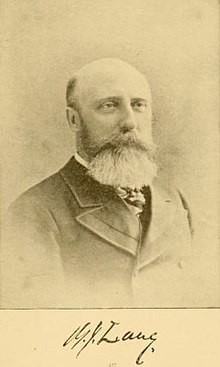Benjamin Johnson Lang
Benjamin Johnson Lang (born December 28, 1837 in Salem , Massachusetts , † April 3, 1909 in Boston , Massachusetts) was an American organist and pianist, conductor and composer .
Life
Lang had first music lessons from his father, the piano maker, organist and music teacher Benjamin Lang and then from the Boston pianist Francis G. Hill . He held positions as organist in various churches in his hometown before he went to Germany in 1855 to study organ, harmony and composition with Alfred Jaell . During this time he also took lessons from Franz Liszt . After his return to the USA he continued his studies with the pianist and composer Gustav Satter (1832–1879).
In the late 1850s, Lang succeeded James Cutler Dunn Parker as organist of the Handel and Haydn Society . In 1857 he played the solo part in Beethoven's choral fantasy under the direction of Carl Zerrahn (1826–1909). He made his conductor's debut in 1862 at the Boston Music Hall with Mendelssohn's First Walpurgis Night . At a Dedicatory Concert in 1863 he performed together with the organists John Knowles Paine , Eugene Thayer , Samuel Parkman Tuckerman and George Washburne Morgan . On Shakespeare's 300th birthday in 1864, he directed the first complete performance of Mendelssohn's Midsummer Night's Dream in Boston.
During a concert tour in Germany, which he u. a. led to Berlin and Leipzig, he stayed with Richard Wagner in Triebschen, with whose wife Cosima he had known since his studies with Liszt. In 1875 he conducted the world premiere of Tchaikovsky's First Piano Concerto in Boston with the soloist Hans von Bülow .
From its founding in 1871 to 1901, Lang directed the Boston Apollo Club , one of the most respected male choirs in the USA, with which he gave hundreds of concerts and among others. a. Performed works by Mendelssohn, Brahms and Grieg as well as by American composers such as George Whitefield Chadwick , Arthur Foote and Whitney Eugene Thayer .
From 1876 he was also the conductor of The Cecilia , a mixed choir that often performed with orchestral accompaniment and performed numerous works by Beethoven, Brahms, Bruch , Dvořák , Gade , Handel , Liszt, Mendelssohn and Schumann . During its existence (until 1917), the choir gave 200 concerts and sang fifteen American and fifteen world premieres. As a guest conductor in Lang's time a. a. Bruch (1882), Parker (1889), Dvořák (1892), Henschel (1902) and Colonne (1904).
Lang also worked as a soloist with the Philharmonic Society of New York , the Boston Symphony Orchestra and the Harvard Musical Association . In 1891 he, as a supporter of Wagner's music, had campaigned for the popularization of Wagner's Bayreuth Festival in the USA and was guest of honor at the premiere of the Ring of the Nibelung in Bayreuth in 1876 , brought Anton Seidl and his orchestra to Boston for the first performance of Parsifal .
From 1895 to 1897 he was Zerrahn's successor head of the Handel and Haydn Society , with which he a. a. Handel's Messiah , Verdi's Requiem and Bach's St. Matthew Passion .
Long composed symphonies, overtures, chamber music, piano pieces, church music works and songs. He also worked as a piano teacher; his most important students were Arthur Foote , Ethelbert Nevin (1862-1901) and William Foster Apthorp (1848-1913). His children were also known as musicians: Margaret Ruthven Lang (1867–1972) as a composer, Rosamond Lang (1878–1971) as a pianist and Malcolm Lang (1881–1972) as a pianist and organist.
Works
- The Chase , UA 1882
- Nocturne , 1885
- Sing, Maiden, Sing , UA 1886
- The King Is Dead
- Diversion in C Major , UA 1892
- Te Deum Laudamus in F , UA 1893
- Grand March from David , UA 1894
- Caprice in C major for piano, premiered in 1895
- Diversion in C major
- David , oratorio
| personal data | |
|---|---|
| SURNAME | Lang, Benjamin Johnson |
| BRIEF DESCRIPTION | American pianist, organist, conductor and composer |
| DATE OF BIRTH | December 28, 1837 |
| PLACE OF BIRTH | Salem , Massachusetts |
| DATE OF DEATH | April 3, 1909 |
| Place of death | Boston , Massachusetts |
